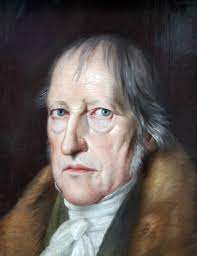The Modern Revolution in the Doctrine of God
I have here before talked about the book that launched my interest in modern theology and especially modern thinking about God: God after God by theologian Robert Jenson. But what was the revolution in thinking about God among Christian philosophers and theologians that God after God illustrated?
Of course we could trace the revolution I’m talking about further and further back; that’s always the way it is. Who started it? “It” referring to any revolutionary way of thinking about something.
But one thing is clear to anyone who has studied modern thinking about God deeply. Hegel (G. W. F. Hegel) took a giant leap. Whether that leap was forward to backward in terms of value is debatable.
Hegel dared to posit that God is not substance but subject (Subject!). Before him, even with Schleiermacher and the deists, God was thought of primarily as substance—eternal, immutable, simple substance (“simple” as in not constituted of parts).
According to Hegel that way of thinking about God led directly into the infamous “Atheismus Streit” in the German universities with Fichte leading the way. Fichte argued that God cannot be BOTH infinite AND personal. Hegel agreed—up to a point. Fichte argued that a person must have an “other” to be personal with. Hegel posited that God’s “other” is the “world” (the universe) and especially humanity. The result was Hegel’s panentheism.
Many post-Hegel Christian philosophers and theologians agreed with Hegel but many did not want to go as far as Hegel in making God depend on the world. Especially in the 20th century Hegel’s revolutionary thinking about God bore fruit (whether good or bad fruit) in various forms.
One that is almost never recognized, as to its dependence on Hegel, was Karl Barth’s vehement declaration that God is never object but always subject and an event more than a substance. This was Barth’s famous (or infamous) “divine actualism” outlined by Hans Urs von Balthasar in his book about Barth’s theology (which Barth endorsed).
God is what God does. God is the “one who loves in freedom.” God as “perfections” but not attributes. God goes out of himself and comes to us.
Yes, Barth was very reluctant to say that God “becomes,” but his disciple Eberhard Juengel wasn’t. He argued that God’s being is in becoming. Jenson and Moltmann picked upon Barth’s actualism of the divine and carried it further, making God dynamic rather than static, but without the panentheism of Hegel.
Hans Kueng wrote a whole book about Hegel and God, arguing that Hegel was basically right even if he went too far in tying God and the world together in absolute interdependence. The book was Das Menschwerdung Gottes (The Incarnation of God).
The shadow of Hegel falls over modern Christian thinking about God even where Hegel is repudiated—as in the case of Barth. God as irreducible Subject rather than Substance. God as dynamic, becoming, changing—not in essence but in experience.
The “historicity of God.” That is the idea Jenson opened up to me. Ever since I have been chasing it. How to think of God as Subject rather than Substance without falling into panentheism. And why not panentheism? Simply because IF panentheism is true, grace is not grace. Grace must be gratituious (a tautology) and not forced. If God depends on the world, his creation and redemption of the world is not gratuitous, not of grace alone.
Panentheism is essentially philosophical, not gospel-centered.
*Note: If you choose to comment or question, keep it relatively brief (no more than 100 words), on topic, addressed to me, civil and respectful (not hostile or argumentative), and devoid of pictures or links.*














